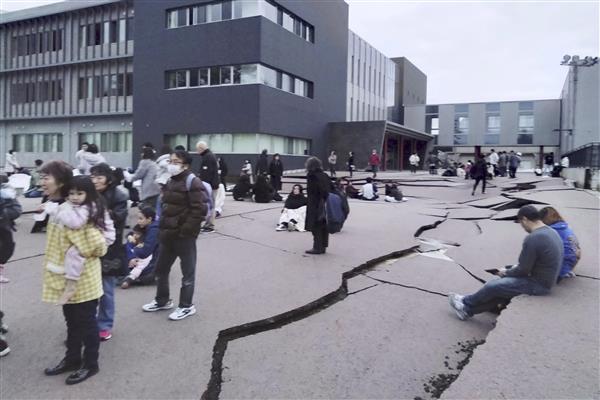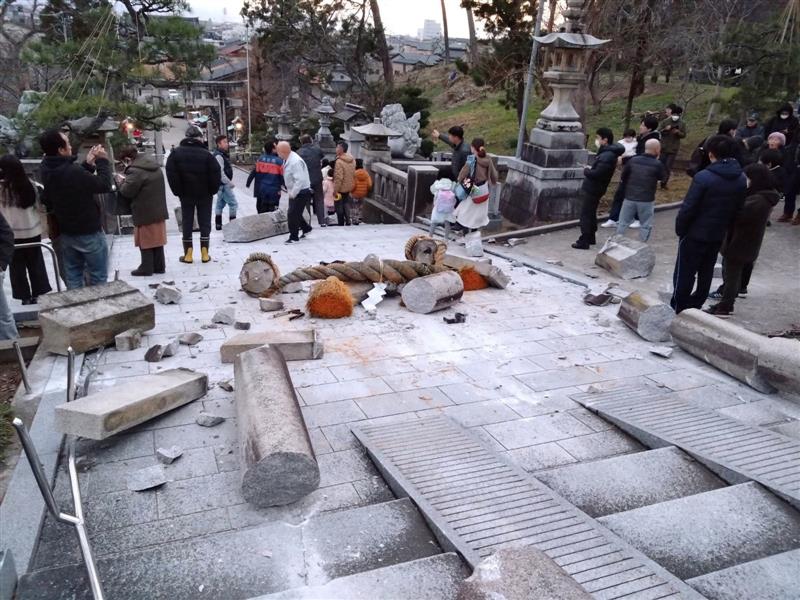3 metre high tsunami expected to hit Niigata and other prefectures on western coast of Japan

Tokyo, January 1
Japan issued tsunami alerts and ordered evacuations following a series of earthquakes on Monday that started a fire and trapped people under rubble on the west coast of its main island.

The Japan Meteorological Agency reported more than a dozen quakes off the coast of Ishikawa and nearby prefectures shortly after 4 p.m., one of them with a preliminary magnitude of 7.6.
The agency issued a major tsunami warning for Ishikawa and lower-level tsunami warnings or advisories for the rest of the western coast of the island of Honshu, as well as the northernmost of its main islands, Hokkaido.
Japanese public broadcaster NHK TV warned torrents of water could reach as high as 5 metre and urged people to flee to high land or the top of a nearby building as quickly as possible.
NHK said the tsunami waves could keep returning, and warnings were continuing to be aired hours after the initial alert. Several aftershocks also rocked the region.
Government spokesman Yoshimasa Hayashi said it was critical for people in coastal areas to get away from the oncoming tsunami.
“Every minute counts. Please evacuate to a safe area immediately,” he said.
A tsunami of about 3 metre high was expected to hit Niigata and other prefectures on the western coast of Japan, and the waves were confirmed to have reached parts of the coastline.
At least six homes were damaged by the quakes, with people trapped inside. A fire has broken out in Wajima city, Ishikawa Prefecture, and electricity is out for more than 30,000 households, Hayashi said.
He said no reports of deaths or injuries had been confirmed, saying the situation was still unclear. Japan’s military was taking part in the rescue efforts, he said.
Japanese media footage showed people running through the streets, and red smoke spewing from a fire in a residential neighborhood. Photos showed a crowd of people, including a woman with a baby on her back, standing by huge cracks that had ripped through the pavement.
Bullet trains in the area were halted. Parts of the highway were also closed, and water pipes had burst, according to NHK. Some cell phone services in the region weren’t working.
The Meteorological Agency said in a nationally broadcast news conference that more major quakes could hit the area over the next week, especially in the next two or three days.
More than a dozen strong quakes had been detected in the region, with risks of setting off landslides and houses collapsing, according to the agency.
Takashi Wakabayashi, a worker at a convenience store in Ishikawa Prefecture, said some items had tumbled from the shelves, but the biggest problem was the huge crowd of people who had shown up to stock up on bottled water, rice balls and bread.
“We have customers at three times the level of usual,” he said.
Tsunami warnings were also issued for parts of North Korea and Russia. Russian officials issued a tsunami alert for the island of Sakhalin, warning that areas across the island’s west coast could be affected by the waves.
In nearby South Korea, the weather agency urged residents in some eastern coastal towns to watch for possible changes in sea levels. Tsunami waves that hit later can be bigger than the initial ones.
The Japanese government has set up a special emergency centre to gather information on the quakes and tsunami and relay them speedily to residents to ensure safety, Prime Minister Fumio Kishida told reporters.
He reiterated the warning for immediate evacuation in affected areas.
Japan is an extremely quake-prone nation. In March 2011, a major quake and tsunami caused meltdowns at a nuclear plant. Government spokesman Hayashi told reporters that nuclear plants in the affected area had not reported any irregularities on Monday.
